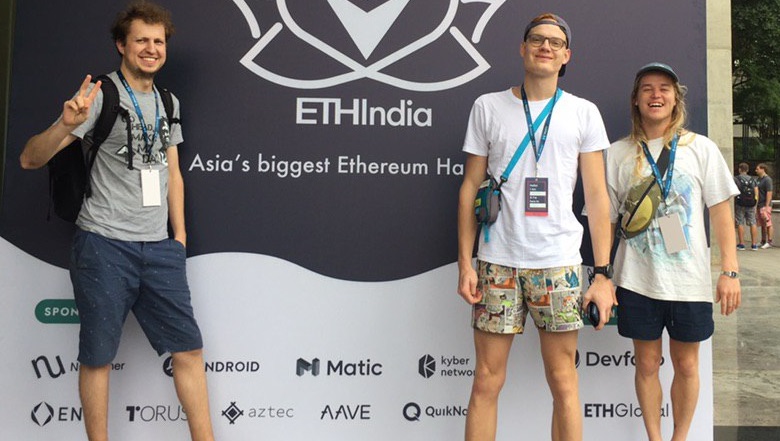We all have them. Those apps we open without thinking. Not because we need anything in particular, but because they feel… safe, in some…
SA trio behind Wildcards betting on social status to propel their endangered wildlife token

Protecting endangered wildlife can do more than just save the planet. For some pledging their support for a good cause can help elevate their social status.
It’s this that the trio behind SA startup Wildcards is hoping to leverage off.
The startup — launched in mid 2019 by SA founders Jason Smythe, Jonjon Clark and Denham Preen (pictured above, from left to right), all 25 years old — has already cracked the nod from Swiss Crypto Valley Venture Capital’s (CV VC), which invested an undisclosed amount in the startup late last year.
Wildcards is a crypto platform that allows users to help save endangered animals by trading what it calls, “digital endangered animal collectables” or digital animals (called NFTS’s) representing endangered animals.
Users adopt these animals (actual individual animals or a token to represent the greater species of that endangered animal) and contribute to protecting them, via a tax levied on the sale of each token (the so-called “Harberger tax”).
Wildcards, which was founded in mid-2019 scored an undisclosed investment last year from Swiss crypto investor CV VC
All funds flow transparently and can be linked to a user’s social network profile to offer added verification.
Through the use of gamification, such as challenges and badges, the startup aims to encourage engagement, while educational segments create awareness on the current state of animal extinction.
The startup is currently part of the second cohort of CV VC’s accelerator, which began in November and is due to conclude in March.
Another SA startup Cape Town based crypto startup PocketJam, a platform that incentivises children to solve math problems to earn pocket money, last year netted $75 000 from CV VC (see this story).
CV VC’s current cohort also includes Johannesburg based Xion, which makes it easy for retailers to utilise subscription models and engage with their customers to supply products globally by using the distributed ledger technology.
The crypto investor has invested an undisclosed amount in Wildcards. While Clark said he couldn’t disclose the amount, CV VC says on its website that it invests up to $125 000 in return for a 10% stake in each startup.
In addition, Wildcards is also part of the current cohort of gaming developer Ubisoft’s acceleration programme which is currently under way in Station F in Paris, and the three regularly commute between Paris and Zug, a four-hour train ride away, where the CV VC programme is taking place.
‘Getting plugged into ETH community’
Clark, who is originally from Johannesburg, told Ventureburn earlier this week in a call from Zurich, where he is currently based, that he, Preen and Smythe first met at UCT during 2017 when they were in Computer Science honours class together.
Clark and Preen formed the startup after coming together to compete at blockchain hackathon ETHCape Town in April last year. Wildcards was one of the 15 winners (see this story).
After ETHCape Town, Wildcards took part in a number of other hackathons, including ETHIndia in Bangalore, ETHLondon and Diffusion 2019 in Berlin.
The three used the prize money they won at the hackathons to cover their travel costs, said Clark. “It’s fun to travel, but more than travelling you get really plugged into the Ethereum community,” he added.
So far the three have built a number of other applications at the hackathons (most of which they have yet to deploy), including a carbon credit marketplace they built at Diffusion 2019, that uses the indigenous South African succulent, Spekboom.
Solution not easy to grasp
Clark pointed out how the three are exploring patronage markets — where social status is seen as a currency. For example, those that buy tokens can have these verified by linking them to their profile on a social network such as Twitter, where a badge is then displayed on their profile. This, he says acts to elevate a user’s social standing.
He said the startup currently has 13 animals listed, totalling over $1100 of value in Ether (ETH).
So far the startup has signed up two conservation organisations, the Wild Tomorrow Fund which has activities in Africa, including a programme to protect hyenas and Senda Verde, a Bolivian organisation which helps rehabilitate displaced animals such as jaguars.
But he conceded that the startup’s solution is not easy for the average person to grasp. “I think that’s one of the barriers we face,” he added.
In addition, the three have yet to generate any revenue from the platform. Clark reckons they will do so by charging a small fee, perhaps five percent, on transactions, but admits they have yet to finalise any fee structure.
Added to this, they haven’t advertised the platform yet. Rather the three have being making an income through software consulting.
It’s early days, but the three, says Clark, are still learning and iterating as they go on their way. The question is, will donors and conservationists take to it?
Read more: Swiss crypto fund CV VC has invested $75k in SA startup PocketJam, confirms co-founder
Read more: Swiss crypto investor CV VC mulling setting up African chapter in Mauritius
Read more: Here are the 15 winning blockchain applications from ETHCapeTown
Featured image (left to right): Wildcards founders Jason Smythe, Jonjon Clark and Denham Preen (Supplied)

